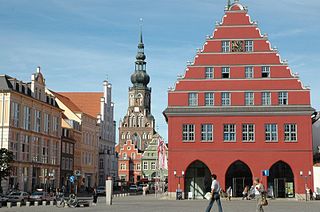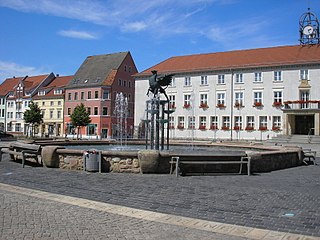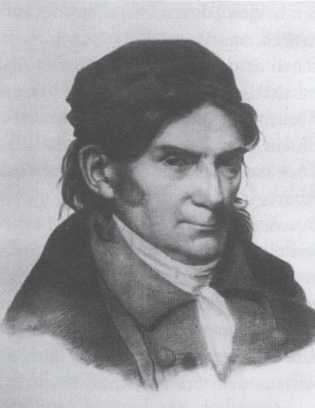Related Research Articles

Greifswald, officially the University and Hanseatic City of Greifswald is the fourth-largest city in the German state of Mecklenburg-Western Pomerania after Rostock, Schwerin and Neubrandenburg. In 2021 it surpassed Stralsund for the first time, and became the largest city in the Pomeranian part of the state. It sits on the River Ryck, at its mouth into the Danish Wiek, a sub-bay of the Bay of Greifswald, which is itself a sub-bay of the Bay of Pomerania of the Baltic Sea.

Anklam is a town in the Western Pomerania region of Mecklenburg-Vorpommern in north-eastern Germany. It is situated on the banks of the Peene river, just 8 km from its mouth in the Kleines Haff, the western part of the Szczecin Lagoon. Anklam has a population of 12,177 (2021) and was the capital of the former Ostvorpommern district. Since September 2011, it has been part of the district of Vorpommern-Greifswald.

Swedish Pomerania was a dominion under the Swedish Crown from 1630 to 1815 on what is now the Baltic coast of Germany and Poland. Following the Polish War and the Thirty Years' War, Sweden held extensive control over the lands on the southern Baltic coast, including Pomerania and parts of Livonia and Prussia.

The history of Pomerania starts shortly before 1000 AD, with ongoing conquests by newly arrived Polans rulers. Before that, the area was recorded nearly 2000 years ago as Germania, and in modern times Pomerania has been split between Germany and Poland. Its name comes from the Slavic po more, which means "land at the sea".

Pasewalk is a town in the Vorpommern-Greifswald district, in the state of Mecklenburg-Vorpommern in Germany. Located on the Uecker river, it is the capital of the former Uecker-Randow district, and the seat of the Uecker-Randow-Tal Amt, of which it is not part.

Herfried Münkler is a German political scientist. He is a Professor of Political Theory at Humboldt University in Berlin. Münkler is a regular commentator on global affairs in the German-language media and author of numerous books on the history of political ideas, on state-building and on the theory of war, such as "Machiavelli" (1982), "Gewalt und Ordnung" (1992), "The New Wars" and "Empires: The Logic of World Domination from Ancient Rome to the United States". In 2009 Münkler was awarded the Leipzig Book Fair Prize in the category "Non-fiction" for Die Deutschen und ihre Mythen.

Bogislaw XIII of Pomerania, son of Philip I and Maria of Saxony, was a prince of Stettin and Wolgast, and a member of the Griffins.
The Gustow group is an archaeological culture of the Roman Iron Age in Western Pomerania. The Gustow group is associated with the Germanic tribe of the Rugii.

Ernst Ludwig was duke of Pomerania from 1560 to 1592. From 1569 to 1592, he was duke in the Teilherzogtum Pomerania-Wolgast, sharing the rule over the Duchy of Pomerania with his older brother Johann Friedrich, duke in the other Teilherzogtum Pomerania-Stettin and bishop of Cammin.

Philipp Julius was duke of Pomerania in the Teilherzogtum Pomerania-Wolgast from 1592 to 1625.

The capitulation of Franzburg was a treaty providing for the capitulation of the Duchy of Pomerania to the forces of the Holy Roman Empire during the Thirty Years' War. It was signed on 10 November (O.S.) or 20 November (N.S.) 1627 by Bogislaw XIV, Duke of Pomerania and Hans Georg von Arnim, commander in chief of an occupation force belonging to the army of Ferdinand II, Holy Roman Emperor, led by Albrecht von Wallenstein. While the terms of the capitulation were unfavourable for the Duchy of Pomerania already, occupation became even more burdensome when the occupation force did not adhere to the restrictions outlined in Franzburg. Stralsund resisted with Danish, Swedish and Scottish support, another Danish intervention failed. Imperial occupation lasted until Swedish forces invaded in 1630, and subsequently cleared all of the Duchy of Pomerania of imperial forces until 1631.
Heinz Schilling is a German historian.

FältmarskalkCarl Gustaf Wrangel was a Swedish Statesman and Military Commander who commanded the Swedish forces in the Thirty Years' War, as well as the Torstenson, Bremen, Second Northern and Scanian Wars.
Degener Buggenhagen, also spelled Degner Buggenhagen was a German nobleman and Hereditary Lord Marshal of the Duchy of Pomerania-Wolgast.

Johann Friedrich Mayer was a German Lutheran theologian and professor of theology at Wittenberg University. He was an important champion of Lutheran orthodoxy and General Superintendent of Swedish Pomerania.

Reinhold Wilhelm Buchholz was a German zoologist who made contributions in the fields of herpetology, carcinology and ichthyology.

Karl Schildener was a German lawyer, legal historian and university lecturer.
Dirk Alvermann was a German historian and archivist.
Kurt Kluxen was a German historian. From 1963 to 1979 Kluxen taught as a full professor for middle and modern history at the University of Erlangen-Nuremberg. He became known to a wider audience mainly through his History of England.
Rudolf Vierhaus was a German historian who mainly researched the Early modern period. He had been a professor at the newly founded Ruhr University Bochum since 1964. From 1971, he was director of the Max-Planck-Institut für Geschichte in Göttingen. He became known for his research on the Age of Enlightenment.